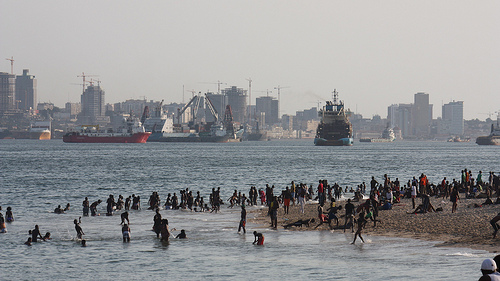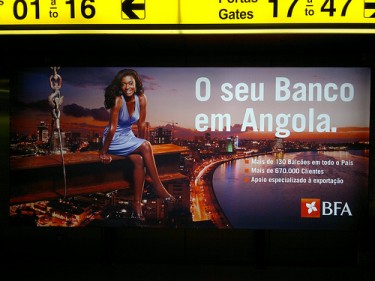For years, Angola has lived in Portugal's shadow, but things are changing; now it's money coming from Angolan tourists which is filling up the cash registers of Portugal's high-end shops. According to a study by Visa Europe, ‘Mediterranean Rim Tourism Monitor‘ [.pdf], between January and April of this year, Angolan tourists have spent more than 87 million euros in Portugal.
In 2011, Angolan tourists spent more than 59.6 million euros, which is an increase, in 2012, of 30 million euros. Orlando Castro, Angolan journalist and author of the blog Alto Hama, highlights [pt] however, that this is in stark contrast to the African reality, where a majority of the population of Africa live on less than 100 euros per day,
o perfil do povo angolano, que representa 70% da população, é pé descalço, barriga vazia, vive nos bairros de lata, é gerado com fome, nasce com fome e morre pouco depois com… fome.
According to Orlando Castro, the Angolan tourists spending money in Portugal are primarily “men in their forties, businessmen from the construction industry, ex-soldiers or men with links to government”.
The Angolans, who constitute 30% of the Portuguese luxury market, spend approximately 350 euros on each item they buy. Orlando Castro reinforces this, saying:
É comum uma loja de luxo facturar, numa só venda, entre 50 e 100 mil euros, pagos por transferência bancária ou cartão de crédito.
Spending by the Angolans as well as the Mozambicans is among those showing the largest increase. Angola is already second in the list of countries most commonly buying from Portugal.
The study by Visa Europe also reveals that cash withdrawals reached a total of 220 million euros between January and April 2012, “and practically all sectors have experienced an increase in expenditure by foreign visitors to Portugal”.
At the start of the year, European Parliament President, Martin Schulz claimed [pt] that the injection of Angolan capital would contribute to Portugal's “decline”, given that money which comes from states where democracy is questioned, jeopardizes the values of Portuguese democracy.
Martin Schulz's words were republished [pt] by on the Cabinda Mpalapanda Civic Association wesbite by Cisco António:
This is the future of Portugal: the economic decline, and a social hazard for people if we cannot comprehend the situation, economically speaking, and above all with our stable democratic and economic system, we will only have the power of suggestion within the European Union.
According to the President of the European Parliament, Portugal should turn to the other European States. However, a majority of these states are currently experiencing an economic crisis themselves, and so in order to try and get itself out of this situation, Portugal has turned to states where democracy is considered a “utopia,” such as Angola and China.
On Angolan website Maka Angola, Angolan journalist Rafael Marques de Morais points out that [pt],
os grandes parceiros económicos de Angola, como a China, Brasil e Portugal têm alimentado, de forma directa, a corrupção, através de concessão de linhas de crédito por petróleo e acordos económicos bilaterais opacos.
Despite this, the Portuguese government continues to work in partnership with Angola; Rafel Marques de Morais has said that,
tais comportamentos asseguram que pouco ou nada se altere em Angola, excepto o dinheiro envolvido que se torna cada vez mais apetecível.
In his blog, Pegadas Luís Moreira confirms that [pt],
a pouco a pouco o dinheiro angolano vai dominando empresas e sectores económicos em Portugal, desde a banca, à comunicação social, aos sectores agrícolas do azeite e do vinho.
An article [pt] published at the end of July by Deutsche Welle indicates that for Portuguese Joint-Minister and minister for Parliamentary Affairs, Miguel Relvas, relations with Angola are “inseparable, hence the reason that we have seen an increase of Angolan investment in Portugal”. The minister was involved with the closure of a public radio programme in January 2012, after a story – reported by Global Voices – was broadcast which criticised the control over the Portuguese media by Angolan economic groups.
In his Pegadas blog, Luís Moreira, points out that [pt]:
o grande problema de aceitarmos como sócios países não democráticos e sem estado de direito é que os novos sócios, rapidamente, olham para o nosso país como olham para o deles. Tudo se compra, não há limites à trafulhice, nem à ganância.
In May 2011, Invest Lisbon, a partner of AICEP (which aims to encourage foreign investment in Portugal), organised a conference in Luanda aimed at attracting Angolan investors, a specific group of entrepreneurs with the capability and scope to invest internationally, and the slogan was ‘Lisbon is your capital of Europe’ [.pdf, pt].
In the Maka Angola blog, it is stated that [pt],
entre o investimento legítimo e o branqueamento de capitais, Portugal contínua a ser o destino preferido dos ricos angolanos e a sua melhor lavandaria financeira.
Website Circulo Angolanos Intelectual (Angolan Intellectual Circle) emphasises that [pt]:
O novo-riquismo angolano em todo o seu esplendor, têm muito dinheiro e gastam muito dinheiro, todos viajam muito, por todo o mundo, compram palácios, mansões, não têm mãos a medir dado o seu incomensurável poder aquisitivo. É assim a vida dos mais ricos e mais abastados angolanos, continuam na rota do dinheiro indiferentes a pobreza da maior parte da população angolana. As desigualdades sociais em Angola, Luanda em particular, são enormes, aberrantes e absurdas para um país que ainda não se afirmou e tarda em encontrar-se
Portugal is, therefore, an obligatory destination for Angolans with money who will continue to take a chance on it, indifferent to the economic crisis which is devastating Europe.









3 comments
Portugal has a Nazi problem I noticed from Anthony Bourdain’s No Reservation episode where the local named Lupo as in “Wolfe” had distinctly different coloring from the young Portuguese at the table.
It’s so weird that the Japanese raped the Portuguese nurses as well as the Chinese ones the day after Pearl Harbor through Christmas in 1941. Of course, they did the same to the British Commonwealth nurses – English, Aussie, Canadian.
How do you traipse through those European and Antipodean cities after you’ve done that?
Portugal is a dream destination, every one wanna love to visit and enjoy beautiful places there.
Pamela Walker
TorontoSuites